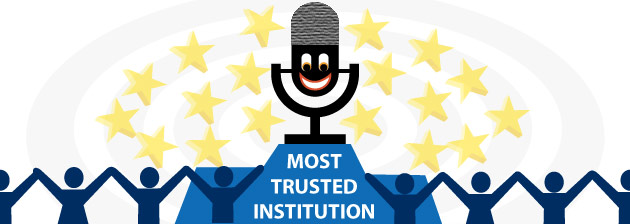Wednesday, 17 Jul 2013
Kenyan Media, most trusted?
0
0

By Boni Odinga, Internews in Kenya.
On their inauguration President Uhuru Kenyatta and deputy president William Ruto congratulated the media for a job well done. Many pundits however read much into it saying that the media should be wary anytime the government plays cozy and cordial, unless the media does not mind the tag of being embedded.
It is three months later and two polling firms, Ipsos Synovate and Infotrak have done surveys that show that by and large the media is the most trusted institution. This comes against a trend of absolute erosion of confidence in other institutions like the Supreme Court, the Independent Electoral and Boundaries Commission (IEBC), the judiciary and of course the perennial underperformers, the Kenya Police.
In the Infotrak poll, a total of 2,343 respondents were polled whereas 2,000 were polled by Ipsos.
The Infotrak poll gives the media an approval rating of 57 per cent against Synovate’s 46 per cent. However the most interesting point to note is that the approval ratings seem to significantly follow recent voting patterns. In the Jubilee areas of Central Kenya and the Rift Valley, the respondents were more than generous in their appraisal of the media whereas in the Cord areas of western and Nyanza, the skepticism with which public institutions are regarded seems to have been extended to the media. I sought the views of two journalists who have a grasp of the two extremes of the politico-media spectrum.
Controversial Royal media talk show host, Waweru Mburu, and Radio Nam Lolwe’s Victor Otieno Juma say the polls must be analyzed while taking into consideration the different patterns of media consumption represented in the two poles of political orientation - Cord and Jubilee. The two insist that in analyzing the findings two key questions emerge: “What media, community or mainstream?”
Waweru opines that in central Kenya radio listerneship is largely vernacular. “If someone isn’t listening to Kameme, it is Coro or Inooro while in western Kenya, for example, apart from the vernacular, we also get listenership for Citizen radio which broadcasts in Kiswahili,” he says. “Whoever took this poll must therefore recognize that in some areas this high approval rating could be for the vernacular stations which are forced to toe the community line.”
Waweru however agrees that the media is the most trusted and challenges them to ask the tough questions. “I see the media too tempted to be embedded with the current government, but the media must step up and ask the tough questions about the promises they made and whether they are keeping them.”
Waweru cites recent examples of what he considers failure by the media. “The IEBC-Kethi saga has not been taken to its logical conclusion. The media must ask tough questions about the IEBC. Personally, I think this saga indicates that the IEBC is seriously compromised and yet no one has been sacked so far,” he says.
Victor Otieno his counterpart from Radio Nam Lolwe says that the research is a bit misleading about Nyanza and western provinces. According to Otieno the approval rating of the local community media would be higher…however it seems that the respondents just had the mainstream media in mind while fielding the questions.
Otieno says that the media must help the country get out of the election campaign disposition which does not allow Kenyans to analyze issues objectively. “If the media continues to sit on its hands ostensibly playing the role of peace makers, who will put the government to task?” he asks.
The two journalists nonetheless say that a vote of confidence in the media gives journalists an opportunity to play their role much more rigorously, as the public watchdog.
The findings of the two pollsters on the media, have a statistical difference of 8 per cent , far out of the allowed error margin of + or -2.
0
0
Media Matters Blog - latest posts
The untouchables
For nine days and with no explanation, 8.4 million customers of Equity Bank were unable to withdraw cash from ATMs forcing them to rely on over-the-counter manual withdrawals. The customers waited patiently for the mainstream media to shed light on what had caused the hitch in vain. A statement from the bank on what caused ... Read more
Safe to speak: Securing freedom of information in media
The Media Council of Kenya recently set up a press freedom monitoring portal to record incidents of violence against journalists. Going through the portal, I am amazed at the high number of incidences reported; from the two Nation Media Group journalists who were attacked by the General Service Unit officers in Kibera to The Star ... Read more
How mentoring boosted my career in journalism
My long walk with the media started at Metro FM after I graduated from Daystar University in the early part of this century. I was the love doctor on the Metro love zone. But despite building a reasonable following and playing great love ballads which I enjoyed tremendously, there was no hiding that the show ... Read more
Journalists’ right to information now guaranteed
As the media and the country await legislation on the right to information, a judge in a recent case has given direction as to who can access any information held by the State. High Court Judge Mumbi Ngugi ruled in a case in which Nairobi Law Monthly Limited, publisher of the Nairobi Law Monthly, had ... Read more
Share this page
0
0
|